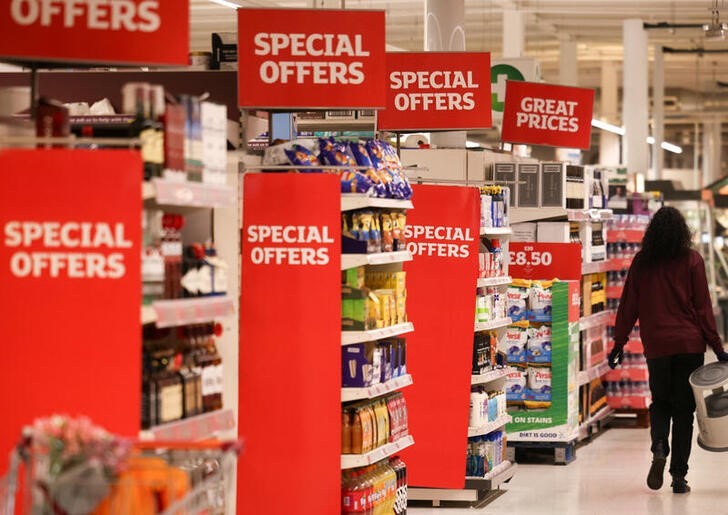By David Milliken
LONDON (Reuters) - British inflation eased last month after hitting a 41-year high in October, offering some comfort to the Bank of England, but the pressure on households remained intense as food and drink prices rose at the fastest pace since 1977.
Annual consumer price inflation fell to 10.5% in December from November's 10.7%, the Office for National Statistics said on Wednesday, a drop in line with economists' forecasts in a Reuters poll.
However, while lower prices for petrol and clothing pushed down the headline rate, the cost of food and non-alcoholic beverages was 16.8% higher than a year earlier, the sharpest increase since September 1977, led by eggs, milk and cheese.
The Bank of England forecast in November that headline CPI would drop from a peak of 11.1% last October to around 5% by the end of 2023 as energy prices stabilise.
But policymakers have warned of continued upward pressure on inflation from a tight jobs market and other factors, and financial markets expect the central bank to raise its main interest rate to 4% on Feb. 2 from 3.5%.
"The lower overall (CPI) rate ... may reduce the risk of a wage-price spiral, but these figures suggest the BoE's job is not yet done," HSBC senior economist Liz Martins said.
Sterling strengthened against the U.S. dollar after the data.
British inflation in December was higher than the 6.5% annual rate recorded for the United States and the 9.6% in Germany.
While natural gas prices are below where they were a year ago, just before Russia's invasion of Ukraine, they are still several times higher than they were in mid-2021 and the impact of the increase continues to feed through the economy.
Core CPI - which excludes energy, food, alcohol and tobacco, and which some economists view as a better guide to underlying inflation trends - was unchanged at 6.3% in December, in contrast to economists' forecast for a drop to 6.2%.
Inflation in services prices - which some BoE officials view as signalling more persistent inflation pressures and the secondary impact of higher energy and wage costs - rose to the highest since March 1992 at 6.8%.
Graphic: UK inflation falls from peak https://www.reuters.com/graphics/BRITAIN-ECONOMY/zgvobrzzepd/chart.png
WAGE PRESSURES
Finance minister Jeremy Hunt said after the figures were released that high inflation was a "nightmare for family budgets", hurt business investment and led to strike action.
"However tough, we need to stick to our plan to bring it down," he said.
Hunt has resisted pay demands from public-sector trade unions, many of whom are taking strike action as their members' wages are rising much more slowly than inflation and by less than the average in the private sector.
Retail price inflation (RPI), used as a benchmark in some pay talks, was 13.4% in December, down from November's 14.0%.
Britain's economy is set to contract this year as inflation squeezes disposable incomes, and the BoE forecasts unemployment will rise, factors which some BoE policymakers have said mean little or no more tightening is likely to be needed.

Other members of the Monetary Policy Committee think it could be a tougher job to steer inflation back to 2% as wages are rising at their fastest rate in over 20 years.
"This week's evidence would suggest that bold action is required," said Hugh Gimber, global market strategist at J.P. Morgan Asset Management, who expects the BoE to raise rates to at least 4.5% before stopping.
